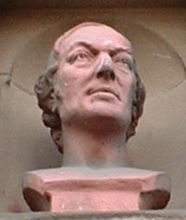Robert Owen (1771 - 1858)

A view of the bust on the front of Secular Hall.
Robert Owen, born the sixth of seven children of an ironmonger and postmaster at Newtown in Wales, was an essentially self-educated man, leaving home at age ten for London and then to Stamford where he was apprenticed to a draper and kindly treated. In 1785, after a brief move to London, he joined a cotton textile manufacturer in Manchester. In the preceding ten years the inventions of Hargreaves, Arkwright and Crompton had been developed and were now being put to use on a mass scale. That year the first steam-driven spinning mill was opened, and Edward Cartwright invented the power loom. With a borrowed capital of £100 he began making spinning 'mules' and setting them to work was soon making a net profit of £300 a year. At the age of 20 he was manager of a large spinning mill employing 500 workers, and by 1797 a partner.
On a business visit to Glasgow he met Anne Caroline Dale, daughter of David Dale, owner of the great spinning mill at New Lanark, which Dale had built with Arkwright in 1780. They married, and Owen and his partners bought the New Lanark mill. In 1800 he moved to Scotland to take over management there, and began to put into practice the ideas which made him known all over Europe as a practical reformer.
He banned employment of young children in his factories, provided schooling, began schemes for old age and sickness insurance. He converted New Lanark into a model community which drew pilgrims, even from Russia. His main principle was that "man's character is made for and not by him". This was contrary to the orthodox thinking, which was that the masses were poor because they were congenitally idle and lacking in self-control, so their poverty was a just consequence of their sins and a part of the divine order of the world. On the contrary he thought that as people were better housed, fed, clothed and given cultural and educational opportunities, rather than being treated as malcontents, so their character, by and large, would be transformed.
For a time statesmen and members of the Royal family were among his supporters, but religious opposition and the need for the ruling class to retain their privileges prevented his reforms being implemented.
He believed that "all the religions of the world are false". He campaigned for a form of Socialism, and later an ethical movement which he called Rational Religion, which attracted 100,000 members. There was not a reform of the time (peace, trade unions, feminism, prisons, education, marriage, etc.) that was not included in his ideal, and he spent hundreds of thousands of pounds on trying to establish utopian communities in America.
He is known for helping to found the first British trade union, and as the father of the cooperative movement.
In 1839 Owen gave a series of four lectures in Leicester, supporting the already strong tradition of free thought in the town. G. J. Holyoake incorporated many of his ideas into ‘Secularism’.
Sources of information:
Joseph McCabe, A Rationalist Encyclopedia (1950).
A. L. Morton: The Life and Ideas of Robert Owen (Lawrence &
Wishart 1962).
Robert
Owen and the cooperative movement